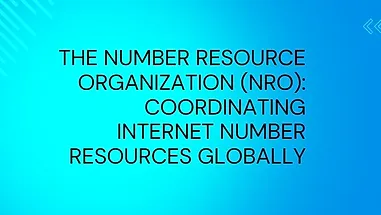The five regional Internet registries (RIRs) are responsible for managing the distribution of Internet Protocol (IP) addresses and Autonomous System Numbers (ASNs). In order to perform their roles effectively, RIRs collaborate through a body called Number Resource Organization (NRO).
You can think of NRO as a coordinating body for all RIRs. The offices in NRO are represented by a member from each RIR.
The NRO was formed in 2003 so that RIRs can coordinate in the management of IP addresses and ASNs.
A Brief History of the NRO
The NRO came into existence on October 24, 2003, through a Memorandum of Understanding (MoU) signed by the four existing RIRs. AFRINIC later joined in April 2005. Working independently of each other, RIRs recognized that it was difficult to create a coordinated effort.
As a result, they convened to create a collaborative effort aimed to enhance the management and allocation of Internet number resources globally. On October 31, 2003, the RIRs sent an Open Letter to ICANN, notifying them of the NRO’s formation and proposing the establishment of the Address Supporting Organization (ASO).
What the NRO Does
The NRO was formed with the goal of actively contributing to an open, stable, and secure Internet. It achieves this mission through several key objectives:
1. Coordinate Internet Number Registry System: The NRO achieves this by managing the allocation of IP addresses and Autonomous System Numbers efficiently.
2. Advocate for Multi-Stakeholder Model: The NRO advocates for a diverse and inclusive approach to policymaking. They do so by campaigning for a multi-stakeholder model and bottom-up policy process in Internet governance.
3. Support for RIRs: The NRO coordinates and supports joint activities among the RIRs. Through the NRO, collaboration among RIRs has become more efficient and coordinated.
In addition to its core functions, the NRO also contributes in the following aspects of the Internet:
Resource Pool Protection. The organization works diligently to protect the unallocated Internet number resource pool. It ensures that the remaining resources are used prudently
Community Input. It serves as a focal point for the Internet community to provide input into the RIR system. The NRO can serve as a medium on which diverse voices are heard.
The NRO as ASO
The NRO also acts as ICANN’s Address Supporting Organization (ASO). In this role, they are responsible for making IP address policy recommendations to ICANN. This shows the NRO’s significant influence in shaping global Internet policy.
How the NRO is Structured
The NRO operates through three suborganizations
Executive Council: Comprising CEOs or Directors from each of the five RIRs, the Executive Council is the governing body of the NRO. Key positions within the council, such as Chair, Vice-Chair/Secretary, and Treasurer, rotate annually to ensure fair representation.
‘Secretariat: The NRO’s Secretariat office is led by the Executive Secretary. They facilitate the organization’s activities.
Number Council: Serving as the ASO Address Council, the Number Council is an elected body responsible for overseeing IP Address policy recommendations, managing policy development activities, and appointing members to the ICANN Board. Each RIR appoints three members to the council..
Coordination Efforts
While the NRO itself does not directly manage specific activities, it serves as a coordination point for joint RIR initiatives. These include Resource Certification (RPKI), global RIR statistics reports, global Internet governance activities, and global policy coordination.
The NRO facilitates collaboration across the RIR system through Coordination Groups in various areas, including Communications, Engineering, Registration Services, and Executive leadership.
Despite being a massive network, the Internet remains coordinated and well-structured in great part due to the NRO.




